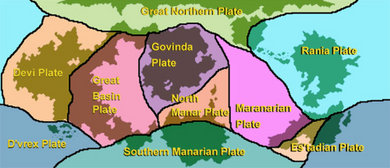Duronis II/Tectonics Map: Difference between revisions
(added entry) |
m (Fixing images) |
||
| Line 1: | Line 1: | ||
{{Duronis}} | {{Duronis}} | ||
A Tectonic plate is a piece of a planet's crust and uppermost mantle (together referred to as the lithosphere). The surface of Duronis II consists of nine major tectonic plates and one minor one. | [[Image:Duronis tectonics 1.jpg|390px|left]]A Tectonic plate is a piece of a planet's crust and uppermost mantle (together referred to as the lithosphere). The surface of Duronis II consists of nine major tectonic plates and one minor one. | ||
The plates are around 100 km (60 miles) thick and consist of two principal types of material: oceanic crust (also called sima from silicon and magnesium) and continental crust (sial from silicon and aluminium). Under both lies a relatively plastic, although non-molten, layer of the planet's mantle called the asthenosphere. | The plates are around 100 km (60 miles) thick and consist of two principal types of material: oceanic crust (also called sima from silicon and magnesium) and continental crust (sial from silicon and aluminium). Under both lies a relatively plastic, although non-molten, layer of the planet's mantle called the asthenosphere. | ||
| Line 7: | Line 6: | ||
The composition of the two types of crust differs markedly. Oceanic crust consists largely of basaltic rocks, while the continental crust consists principally of lower density granitic rocks rich in aluminium and silica. The two types of crust also differ in thickness, with continental crust considerably thicker than oceanic. | The composition of the two types of crust differs markedly. Oceanic crust consists largely of basaltic rocks, while the continental crust consists principally of lower density granitic rocks rich in aluminium and silica. The two types of crust also differ in thickness, with continental crust considerably thicker than oceanic. | ||
[[Image:Duronis tectonics 3.jpg|390px|right]] | [[Image:Duronis tectonics 3.jpg|390px|right]]The churning of the asthenosphere carries the plates along in a process known as continental drift, which is explained by the theory of plate tectonics. Interaction between the plates creates mountains and volcanoes, as well as giving rise to earthquakes and other geological phenomena. | ||
The churning of the asthenosphere carries the plates along in a process known as continental drift, which is explained by the theory of plate tectonics. Interaction between the plates creates mountains and volcanoes, as well as giving rise to earthquakes and other geological phenomena. | |||
[[Image:Duronis tectonics 2.jpg|390px| | [[Image:Duronis tectonics 2.jpg|390px|left]]The boundaries of the plates do not coincide with those of the continents. For instance, the continent of Devi is made up of pieces from the Devi Plate, the Great Basin Plate, the Southern Manarian Plate, and the D'vrex Plate. | ||
The boundaries of the plates do not coincide with those of the continents. For instance, the continent of Devi is made up of pieces from the Devi Plate, the Great Basin Plate, the Southern Manarian Plate, and the D'vrex Plate. | |||
As far as is known, Duronis II is the only planet in the solar system to possess active plate tectonics, although there are suggestions that different styles of plate tectonics are in operation on Duronis III and several of the satellites in the system. | As far as is known, Duronis II is the only planet in the solar system to possess active plate tectonics, although there are suggestions that different styles of plate tectonics are in operation on Duronis III and several of the satellites in the system. | ||
[[Category:Duronis II]] | [[Category:Duronis II]] | ||
Revision as of 05:31, 21 March 2007
| Duronis II |
| The People: Laudeans | Laudean Fielding |
| Duronis System: Luxis system | Duronis II | Planetary Data | Stellar Cartography |
| Geography: Map - Time Zones | Map - Tectonic Plates |
| Environmental: Flora and Fauna |
| Federation Embassy: Embassy of Duronis II | Embassy Crew |
A Tectonic plate is a piece of a planet's crust and uppermost mantle (together referred to as the lithosphere). The surface of Duronis II consists of nine major tectonic plates and one minor one.
The plates are around 100 km (60 miles) thick and consist of two principal types of material: oceanic crust (also called sima from silicon and magnesium) and continental crust (sial from silicon and aluminium). Under both lies a relatively plastic, although non-molten, layer of the planet's mantle called the asthenosphere.
The composition of the two types of crust differs markedly. Oceanic crust consists largely of basaltic rocks, while the continental crust consists principally of lower density granitic rocks rich in aluminium and silica. The two types of crust also differ in thickness, with continental crust considerably thicker than oceanic.
The churning of the asthenosphere carries the plates along in a process known as continental drift, which is explained by the theory of plate tectonics. Interaction between the plates creates mountains and volcanoes, as well as giving rise to earthquakes and other geological phenomena.
The boundaries of the plates do not coincide with those of the continents. For instance, the continent of Devi is made up of pieces from the Devi Plate, the Great Basin Plate, the Southern Manarian Plate, and the D'vrex Plate.
As far as is known, Duronis II is the only planet in the solar system to possess active plate tectonics, although there are suggestions that different styles of plate tectonics are in operation on Duronis III and several of the satellites in the system.


